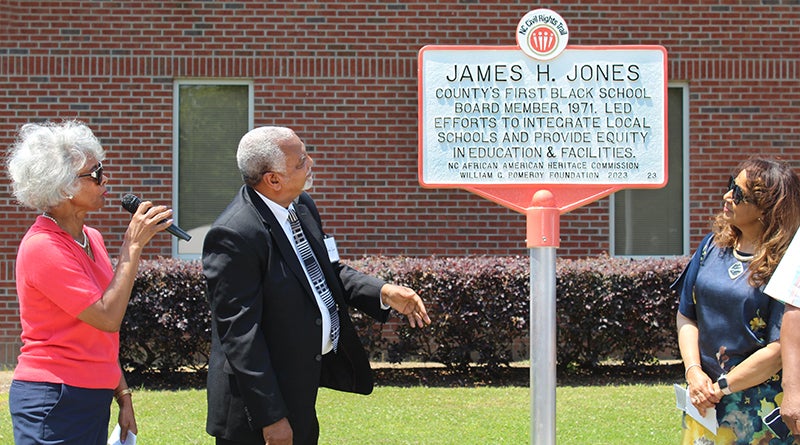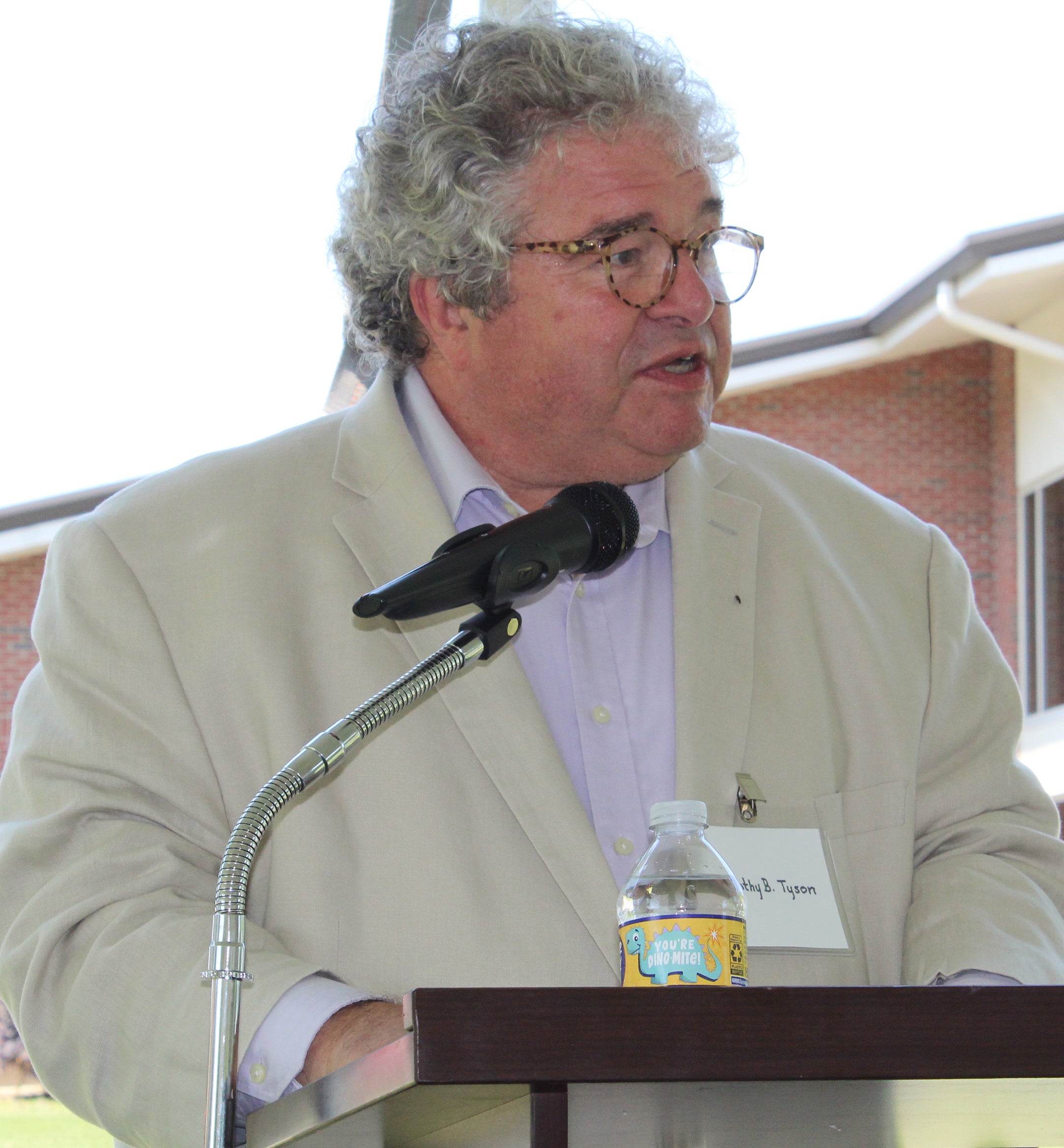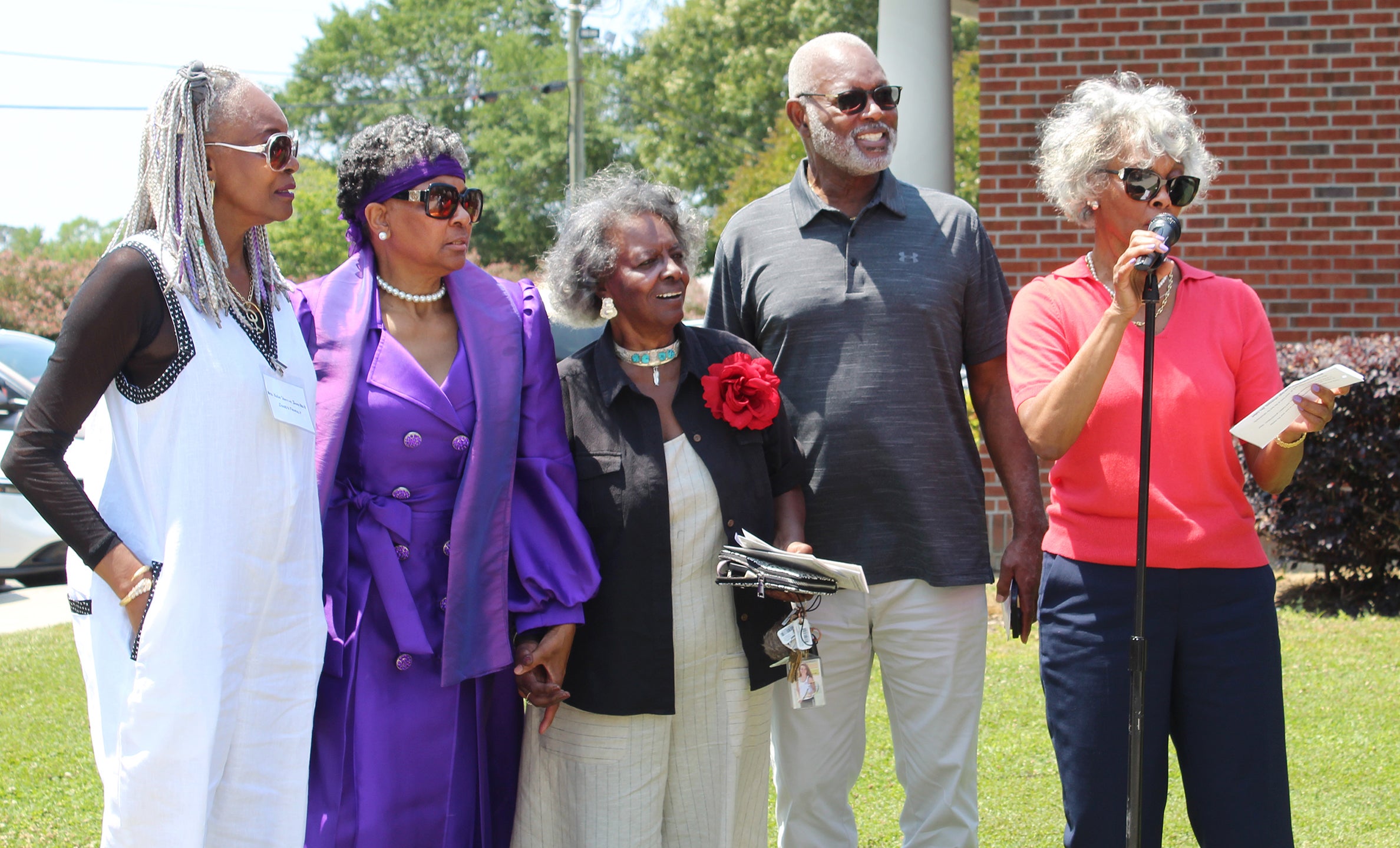Remembering a legend
Published 4:34 pm Friday, June 9, 2023

- Anna Jones (left) reads the text on the new NC Civil Rights Trail marker which honors the legacy of her father, James H. Jones. Northampton County Commissioner Chair Charles Tyner and Northampton Schools Superintendent Dr. Rosa Atkins look on after helping unveil the marker. Staff Photo by Holly Taylor
|
Getting your Trinity Audio player ready...
|
JACKSON – Those traveling past the Northampton County Schools Central Office in Jackson might notice a new fixture in front of the building.

Dr. Timothy Tyson, a North Carolina historian and professor, served as the keynote speaker for the event to provide historical context for Jones’ educational accomplishments. Staff Photo by Holly Taylor
That fixture is a newly erected marker, a part of the North Carolina Civil Rights Trail. It honors the late James H. Jones, who was the first Black person to serve on Northampton County’s Board of Education and also the first Black person in all of North Carolina to serve as Chair of a Board of Education.
A celebration to unveil the marker was held on June 3.
“Most of the victories of the Civil Rights movement were not won in Birmingham or Selma, but in the lives of people we nearly always forget,” said Dr. Timothy Tyson, a historian and professor who served as the keynote speaker for the event.
“The real leaders were mostly local and mostly forgotten, even though they altered the arc of American history,” Tyson explained. “Which is why I’m so pleased to be here today to mark the life and work of Mr. James H. Jones along the Civil Rights Trail. When we honor him, we honor the best that is in us. His story has been told today at long last.”
Jones was born in Northampton County to a family of sharecroppers in 1916. He married Viola Brown in 1941, and eventually broke free from sharecropping to become an independent farmer in Pleasant Hill. He and his family attended church at Roanoke Chapel Missionary Baptist Church, where he held a number of leadership positions including Deacon Chair and Sunday School Superintendent.
Even though he earned his living as a farmer, Jones knew the value of education and worked to ensure an adequate education for his children. When Squire Elementary School opened in Gaston, Jones served as the first president of the Parent Teacher Association.
During segregation, Jones and other school leaders led campaigns for securing basic facilities for Squire. As “freedom of choice” began as a way to start integrating schools, Jones enrolled his children in the white school in Gaston and they endured the turbulence of the times.
While the local schools were slowly attempting integration, there was no Black representation on the Northampton County Board of Education. Jones ran twice for a seat on the five-member board but was unsuccessful both times. When the board was expanded to seven seats in 1971, Jones was appointed to serve.
After that, he successfully won reelection to the school board for several consecutive terms, and in 1980, he was selected by his fellow board members to serve as Chairman. He was the first Black person in serve in that position throughout all of North Carolina.
During his time on the Northampton school board, the district hired their first Black school superintendent, Dr. Willis McLeod, and was accredited by the state for the first time.
Jones’ time, however, was cut short when he was killed in a farming accident in 1984. But for his impact on education, Jones was posthumously inducted into the Educators Hall of Fame at East Carolina University in 2014.
His daughter, Anna Jones, also produced a documentary entitled “Chairman Jones – An Improbable Leader,” in 2015 to document his accomplishments. The film was screened before Saturday’s dedication event to a full crowd.
Others taking part in the marker unveiling included Northampton Schools Superintendent Dr. Rosa Atkins, who provided the welcome; Northampton Board of Commissioners Chair Rev. Charles Tyner, who provided the opening prayer; and Deion Warren, a Conway singer who led the crowd in a rendition of “Lift Every Voice and Sing.”
NC House Representative Michael Wray made a brief presentation on behalf of the NC General Assembly, and Kim Mack spoke on behalf of US Congressman Don Davis.
Dr. Willie Gilchrist, former chancellor of Elizabeth City State University, spoke about how Jones played a role in his time with Northampton County Schools.
Gilchrist and his wife had moved to the area from New York in 1978, and he had hopes for a principal job with the local school district. He didn’t get that position at first, but Jones told Gilchrist to be patient. He mentored Gilchrist and offered wisdom along the way, encouraging him to take a position at Jackson-Eastside school first before he was eventually selected to serve as principal of Gumberry High School.

Anna Jones (right), joined by some of her siblings at the June 3 event, addresses the crowd before the unveiling of the Civil Rights Trail marker dedicated to their father. Staff Photo by Holly Taylor
“I accepted his wisdom,” Gilchrist explained. “He spent so many hours with us, trying to mold us, shape us, and cause us to be better. And then he had to go home and do the same thing at home with his family.”
Gilchrist said he was looking forward to showing the marker to his grandkids and telling them the story of how he got here.
“I rode the back of a giant, and that giant was named James Henry Jones,” he concluded.
Anna Jones acknowledged the hard work her father did between farming and promoting education, but her parents made sure to create an atmosphere of respect and generosity in their home.
“Daddy would encourage us,” Ms. Jones explained. “Challenge us to do hard things before we thought we were ready. They showed us how to be good people, and they set a high bar for standards of conduct.”
Dr. Tyson said that Jones’ legacy can be an encouragement to others.
“All we have to do is follow Chairman Jones’ example and make our mark. History has been made in this place, and it will be made again here if we just remember who we are,” he emphasized.
The event concluded with the official unveiling of the marker, located in front of the district’s office.
Standing by her siblings and other family members, Anna Jones noted that the marker will make Northampton County a permanent destination on North Carolina’s Civil Rights Trail.
The Trail is a project presented by the NC African American Heritage Commission in partnership with the NC Office of Archives & History and Visit NC. It is funded through the William G. Pomeroy Foundation.
For more information about the Civil Rights Trail and to view virtual versions of each marker, visit aahc.nc.gov/programs/civil-rights-trail





